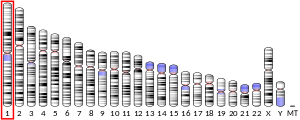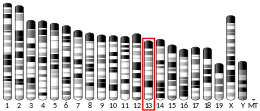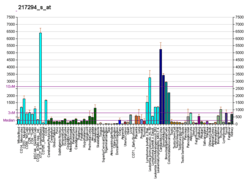EDARADD
Ectodysplasin-A receptor-associated adapter protein is a protein that in humans is encoded by the EDARADD gene.[5][6]
| EDARADD | |||||||||||||||||||||||||
|---|---|---|---|---|---|---|---|---|---|---|---|---|---|---|---|---|---|---|---|---|---|---|---|---|---|
| Identifiers | |||||||||||||||||||||||||
| Aliases | EDARADD, ECTD11A, ECTD11B, ED3, EDA3, EDAR-associated death domain, EDAR associated death domain | ||||||||||||||||||||||||
| External IDs | OMIM: 606603 MGI: 1931001 HomoloGene: 15430 GeneCards: EDARADD | ||||||||||||||||||||||||
| |||||||||||||||||||||||||
| |||||||||||||||||||||||||
| |||||||||||||||||||||||||
| |||||||||||||||||||||||||
| Orthologs | |||||||||||||||||||||||||
| Species | Human | Mouse | |||||||||||||||||||||||
| Entrez | |||||||||||||||||||||||||
| Ensembl | |||||||||||||||||||||||||
| UniProt | |||||||||||||||||||||||||
| RefSeq (mRNA) | |||||||||||||||||||||||||
| RefSeq (protein) | |||||||||||||||||||||||||
| Location (UCSC) | Chr 1: 236.35 – 236.5 Mb | Chr 13: 12.47 – 12.52 Mb | |||||||||||||||||||||||
| PubMed search | [3] | [4] | |||||||||||||||||||||||
| Wikidata | |||||||||||||||||||||||||
| |||||||||||||||||||||||||
Function
This gene was identified by its association with ectodermal dysplasia, and specifically with hypohidrotic ectodermal dysplasia, a genetic disorder characterized by defective development of hair, teeth, and eccrine sweat glands. The protein encoded by this gene is a death domain-containing protein, and is found to interact with EDAR, a death domain receptor known to be required for the development of hair, teeth and other ectodermal derivatives. This protein and EDAR are coexpressed in epithelial cells during the formation of hair follicles and teeth. Through its interaction with EDAR, this protein acts as an adaptor, and links the receptor to downstream signaling pathways. Two alternatively spliced transcript variants of this gene encoding distinct isoforms have been reported.[6]
References
- GRCh38: Ensembl release 89: ENSG00000186197 - Ensembl, May 2017
- GRCm38: Ensembl release 89: ENSMUSG00000095105 - Ensembl, May 2017
- "Human PubMed Reference:". National Center for Biotechnology Information, U.S. National Library of Medicine.
- "Mouse PubMed Reference:". National Center for Biotechnology Information, U.S. National Library of Medicine.
- Headon DJ, Emmal SA, Ferguson BM, Tucker AS, Justice MJ, Sharpe PT, Zonana J, Overbeek PA (Jan 2002). "Gene defect in ectodermal dysplasia implicates a death domain adapter in development". Nature. 414 (6866): 913–6. doi:10.1038/414913a. PMID 11780064.
- "Entrez Gene: EDARADD EDAR-associated death domain".
- Yan M, Zhang Z, Brady JR, Schilbach S, Fairbrother WJ, Dixit VM (March 2002). "Identification of a novel death domain-containing adaptor molecule for ectodysplasin-A receptor that is mutated in crinkled mice". Current Biology. 12 (5): 409–13. doi:10.1016/S0960-9822(02)00687-5. PMID 11882293.
Further reading
- Thesleff I, Mikkola ML (May 2002). "Death receptor signaling giving life to ectodermal organs". Science's STKE. 2002 (131): pe22. doi:10.1126/stke.2002.131.pe22. PMID 11997580.
- Yan M, Zhang Z, Brady JR, Schilbach S, Fairbrother WJ, Dixit VM (March 2002). "Identification of a novel death domain-containing adaptor molecule for ectodysplasin-A receptor that is mutated in crinkled mice". Current Biology. 12 (5): 409–13. doi:10.1016/S0960-9822(02)00687-5. PMID 11882293.
- Kumar A, Eby MT, Sinha S, Jasmin A, Chaudhary PM (January 2001). "The ectodermal dysplasia receptor activates the nuclear factor-kappaB, JNK, and cell death pathways and binds to ectodysplasin A". The Journal of Biological Chemistry. 276 (4): 2668–77. doi:10.1074/jbc.M008356200. PMID 11035039.
- Munoz F, Lestringant G, Sybert V, Frydman M, Alswaini A, Frossard PM, Jorgenson R, Zonana J (July 1997). "Definitive evidence for an autosomal recessive form of hypohidrotic ectodermal dysplasia clinically indistinguishable from the more common X-linked disorder". American Journal of Human Genetics. 61 (1): 94–100. doi:10.1086/513905. PMC 1715866. PMID 9245989.




